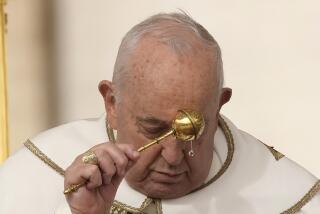Pope Attacks Roots of Terror
- Share via
COLOGNE, Germany — Pope Benedict XVI chose unusually tough language Saturday to tell Muslim leaders they must work harder to combat terrorism and steer youths away from “the darkness of a new barbarism.”
On the third day of his first foreign trip as pope, Benedict met with 10 representatives of Germany’s growing Muslim community as part of his effort to reach out to other faiths. But he quickly dispensed with the diplomatic niceties and zeroed in on the “cruel fanaticism” of terrorism and the responsibility of religious leaders and educators to prevent it.
“You guide Muslim believers and train them in the Islamic faith,” he told his select audience at the archdiocese in Cologne. “Teaching is the vehicle through which ideas and convictions are transmitted.... There is no room for apathy and disengagement, and even less for partiality and sectarianism.”
Benedict condemned terrorism as a “perverse and cruel decision” that “shows contempt for the sacred right to life and undermines the very foundations of all civil society.” Terrorists, he said, falsely use religion to poison relations among faiths.
Benedict’s meeting with the Muslims was not televised, in contrast to his high-profile visit to a synagogue the day before.
His pointed remarks were made to a community with whom his relations were already strained, and marked a departure from the papacy of John Paul II, who worked to promote interfaith dialogue. In his previous post as enforcer of church doctrine, the former Cardinal Joseph Ratzinger had been quite critical of Islam in a number of his writings. Before and after becoming pope in April, he voiced alarm at the loss of Christian identity. He was particularly concerned about Europe, where the rise of multiculturalism has included the accommodation of Islam.
Benedict has been careful, however, not to link terrorism and Islam, and did not go along with an aide’s attempt to condemn the July 7 bombings in London by suspected Islamic militants as an anti-Christian act.
Several Muslim community leaders said they were disappointed that the pope did not visit a mosque, as he had the synagogue, and said that had he done so his message would have had more power.
Emerging from Saturday’s meeting, Muslim leaders sought to find common ground with the pontiff.
“Terrorism is not only a problem that comes up in countries where there are Christians,” said Ridvan Cakir, president of the Turkish-Islamic Union in Europe, who led the delegation that met with the pope.
“It’s a problem that we all share,” he told reporters. “We all have to be aware of that problem and fight against it.”
Benedict’s relations with Islam were already much more complicated than those of John Paul, the first pope to visit a mosque. Muslim leaders here said privately that they were very worried about the new pontiff and what they considered to be his anti-Islamic views.
Most Muslims in Germany are of Turkish heritage. As cardinal, Benedict had spoken out against admitting predominantly Muslim Turkey to the European Union, saying such a move would dilute the continent’s Christian character. Turks were outraged at what they saw as an ethnic slur.
Mahmut Askar, a prominent Muslim leader in Cologne, said he was not surprised at the pope’s stern lecture. Muslims, he said, are routinely and unfairly blamed as a group for the terrorism committed by a handful of extremists.
“We are used to this,” Askar, a Turkish-born engineer who has lived in Germany for more than three decades, said in an interview. He is the secretary-general of a group that represents Turkish Muslims in Germany.
“No one would blame Christianity for terror acts committed by a Christian. But Muslims are always blamed,” he said. “What else can we do to show the world that we are not born terrorists?”
Still, Askar chose his words carefully and chose to thank the pope rather than criticize him.
“With everyone referring these days to the ‘war of civilizations,’ it is very important that we dialogue,” he said.
Germany has one of the oldest and largest Muslim populations in Western Europe. The country is home to at least 3 million Muslims, about 2.5 million of whom are Turks who for decades lived in a largely separate culture that only now is integrating into the larger German society.
Seyda Can, one of three women who attended the meeting with the pope and one of two wearing a head scarf, said she believed in the pope’s call for a stronger dialogue between Christians and Muslims.
“When we have this dialogue, we will have trust and we won’t be afraid,” Can, 27, told reporters after the meeting. “With the dialogue, terrorism will be finished.”
Benedict is in Cologne to preside over World Youth Day, a raucous festival that has brought an estimated 700,000 young Catholics to this city on the Rhine for a week of prayer, music and celebration. The young pilgrims, from nearly 200 countries, gathered in a massive field outside the city for a three-hour prayer vigil with the pope Saturday night and then camped out so they could attend Benedict’s concluding Mass today.
In his remarks to the Muslim leaders, almost all of whom were Turkish, Benedict acknowledged that Christians, too, had killed in the name of religion.
“How many pages of history record battles, and even wars, that have been waged with both sides invoking the name of God, as if fighting and killing the enemy could be pleasing to him?” he said.
“The recollection of these sad events should fill us with shame, for we know only too well what atrocities have been committed in the name of religion.”
More to Read
Sign up for Essential California
The most important California stories and recommendations in your inbox every morning.
You may occasionally receive promotional content from the Los Angeles Times.











